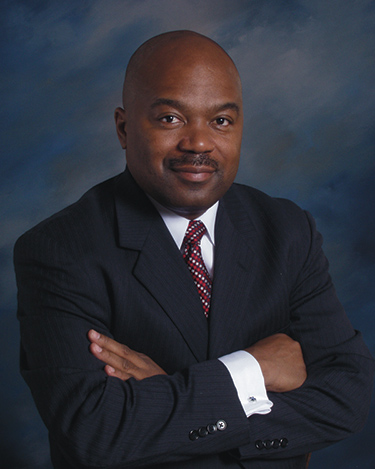Rodney Moore, ’87, takes his place among the nation’s leading lawyers
 He’s the future of the NBA, but has never played against the likes of Brandon Roy or Nate Robinson. He will inspire thousands in his endeavor but will never set foot on a basketball court. That’s because Rodney Moore’s NBA—the National Bar Association—operates in a different kind of court.
He’s the future of the NBA, but has never played against the likes of Brandon Roy or Nate Robinson. He will inspire thousands in his endeavor but will never set foot on a basketball court. That’s because Rodney Moore’s NBA—the National Bar Association—operates in a different kind of court.
Praised as one of the best and brightest by his peers in the most recent edition of Best Lawyers in America, Moore, ’87, has been practicing law for more than 20 years. During his career, he has represented public schools and the entertainment industry. Now as NBA president for 2008-09, he must represent the largest association of African American lawyers and judges in the nation.
The National Bar Association was founded in 1914 when African Americans weren’t allowed to join the American Bar Association. It has grown over the last 80 years, now representing more than 35,000 lawyers, judges and students. “The organization attempts to merge career aspirations and has an added agenda to ensure social justice and equality,” Moore says.
Moore has been actively involved in the organization for the past 20 years, serving for two terms as general counsel and as vice president for section and divisions and regions and affiliates.
During his presidency, Moore hopes to focus attention on the new class of African American lawyers and judges. “There are many young lawyers entering the legal profession who are struggling as a result of the economy,” he says. “It’s tough out there right now, I want to help with the transition.”
Throughout his term, Moore will continue working at the Atlanta law firm Greenberg Traurig. The company fits well within his goals for the National Bar Association. In 2007, it was ranked the country’s number one law firm based on the number of minority partners in the Minority Law Journal’s Diversity Scorecard.
Though surrounded by another kind of Dawg fan—the University of Georgia Bulldogs—the Washington graduate remains a Husky at heart. “I’m still pro-Husky, even though I get attacked for it often,” Moore says, adding that his involvement in minority affairs was shaped at the UW.
“I grew up in northern California, but the Office of Minority Affairs [at the UW] was actively recruiting qualified students,” he recalls. Though he chose a small college in northern California, after his first year Moore transferred to the UW. “I really liked the diversity of the population, and the culture gave it a small-campus feel. I felt like I knew everyone and I always looked forward to new freshmen from all over.”
While working toward his political science degree, he was actively involved in the University’s Black Student Union, serving as president of the UW’s club and executive director of the statewide chapter. “I’d always been active in student government and law,” he says. “I trace my involvement in the NBA back to law school,” which he attended at Santa Clara University.
Despite his many achievements, Moore remains close to his Washington roots and says he travels West for about two football games a year. “I’m glad the Huskies decided to keep [Coach Tyrone] Willingham. There are too many learning institutions with limited opportunities to help athletes develop into strong men and successful people.”